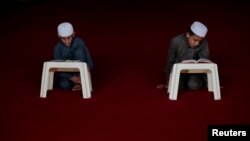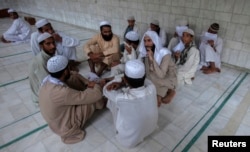Pakistan announced Monday a major reform plan for the "mainstreaming" of more than 30,000 Islamic seminaries, known as madrassas, amid long-running allegations some of these religious schools promote violent extremism and maintain ties to transnational terrorist networks.
Islamabad is under international pressure to act against Islamist groups that continue to operate religious seminaries and other facilities in the country despite being designated as global terrorists by the United Nations.Some of these groups are blamed for plotting cross-border attacks against India and Afghanistan.
Military spokesman Major-General Asif Ghafoor told a news conference at military headquarters in Rawalpindi the reforms to "mainstream" madrassas are being implemented in three phases.He said more than 2.5 million children are studying in madrassas across Pakistan.
"Islamic education will continue to be taught at these madrasas, but there will be no hate speech," Ghafoor said.
Ghafoor noted a government screening of religious schools across the country has found "less than 100 of the more than 30,000 are encouraging violent extremism and terrorism."The rest, he added, are not indulging in such activities and students in these madrassas receive only Islamic education, having no access to contemporary subjects.
The general said Prime Minister Imran Khan has set up a special committee to work with organizations running madrassas to incorporate modern subjects in their syllabus.
Until recently, Ghafoor revealed, the madrassas in Pakistan were under "the purview of the ministry of industries".He did not further explain, but said the religious schools have now been brought under the purview of the education ministry.
Introducing reforms in madrassas has been a highly sensitive issue in Pakistan and Islamist groups running them strongly oppose any such attempts, dismissing them as an anti-Islam Western plot.Supporters acknowledge that madrassas are the only education available to millions of poverty-stricken families in Pakistan and shutting them down is not a practical option.
Ghafoor stressed that religious scholars and clerics are fully behind the government's reform plans and want their students to be taught modern subjects.
This will help children graduating from these institutions to avail the same carrier opportunities that those coming from private and other schools are able to avail," he said.
The spokesman said years of sustained security operations have reduced the threat of militancy and improved security in Pakistan, allowing the government to focus on reforming the madrassas.
Ghafoor explained that a legislative bill is being drafted and will be placed before the parliament within two months, enabling the government to allocate funds and appoint new teachers to teach contemporary subjects to be introduced in the madrassa syllabus.
"The state of Pakistan is determined to do it because we are about to be relatively done with the job of fighting terrorism.Now we have to eliminate this violent extremism from Pakistan and that is possible when all our children have the same education and opportunities," emphasized the army spokesman.
Prime Minister Khan has repeatedly vowed in recent months that militant groups will no longer be allowed to operate out of Pakistan. Authorities have recently also seized control of hundreds of seminaries and charitable medical health units run by proscribed organizations, including those accused of orchestrating attacks in India.










